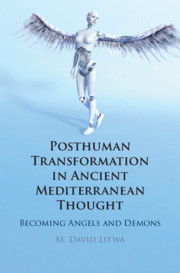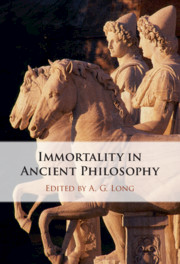Posthuman Transformation in Ancient Mediterranean Thought
There is not just a desire but a profound human need for enhancement - the irrepressible yearning to become better than ourselves. Today, enhancement is often conceived of in terms of biotechnical intervention: genetic modification, prostheses, implants, drug therapy - even mind uploading. The theme of this book is an ancient form of enhancement: a physical upgrade that involves ethical practices of self-realization. It has been called 'angelification' - a transformation by which people become angels. The parallel process is 'daimonification', or becoming daimones. Ranging in time from Hesiod and Empedocles through Plato and Origen to Plotinus and Christian gnostics, this book explores not only how these two forms of posthuman transformation are related, but also how they connect and chasten modern visions of transhumanist enhancement which generally lack a robust account of moral improvement.
- Connects ancient and modern theories of posthuman transformation
- Shows how the themes of posthuman transformation cross religious lines in antiquity as well as modern academic disciplines
- Accessibly written in a narrative format which assumes little prior knowledge of the historical themes and characters
Reviews & endorsements
'In this pioneering and wide-ranging work, Posthuman Transformation in Ancient Mediterranean Thought, M. David Litwa connects contemporary conversations in transhumanist thought with ancient philosophical traditions of angelification (alternatively, 'daimonification'). Chief among this book's virtues is its impressive range: Litwa provides comparative analyses of authors from Greco-Roman, Jewish, Christian, and Hermetic traditions, ranging from the 8th century BCE to the 3rd century CE. Litwa's work is inclusive even of traditions too often treated as marginal (e.g., 'Gnostic' texts), providing a basis for fresh comparative insights.' Travis W. Proctor, Reading Religion
'This is an enjoyable, erudite, and informative book … This book should be read with interest and pleasure by scholars from a range of disciplines but is also accessible to undergraduates and general readers.' Tom Mackenzie, Bryn Mawr Classical Review
'In this pioneering and wide-ranging work, Posthuman Transformation in Ancient Mediterranean Thought, M. David Litwa connects contemporary conversations in transhumanist thought with ancient philosophical traditions of angelification (alternatively, 'daimonification'). Chief among this book's virtues is its impressive range: Litwa provides comparative analyses of authors from Greco-Roman, Jewish, Christian, and Hermetic traditions, ranging from the 8th century BCE to the 3rd century CE. Litwa's work is inclusive even of traditions too often treated as marginal (e.g., 'Gnostic' texts), providing a basis for fresh comparative insights.' Travis W. Proctor, Reading Religion
'… the book will be of great interest to specialists in a variety of subfields, from scholars and students working on ancient Mediterranean religions - including of course Judaism and early Christianity - to anthropologists and sociologists who study ideas of human transformations across the globe in both past and present.' Nickolas P. Roubekas, Religious Studies Review
Product details
January 2021Hardback
9781108843997
248 pages
150 × 230 × 15 mm
0.44kg
Available
Table of Contents
- Preface
- Introduction. Angels, daimones, and the modern thirst for transformation
- 1: Hesiod and daimonification in the Archaic and Classical periods
- 2. Empedocles as daimon
- 3. Plato and the moralization of daimonification
- 4. Daimonification in Xenocrates, Plutarch, Apuleius, and Maximus of Tyre
- 5. Moses angelified in Philo of Alexandria
- 6. Origen, angelification, and the angelified Jesus
- 7. Plotinus as a living daimon
- 8. The angelification of Zostrianos
- Conclusion: Advent or apocalypse?






